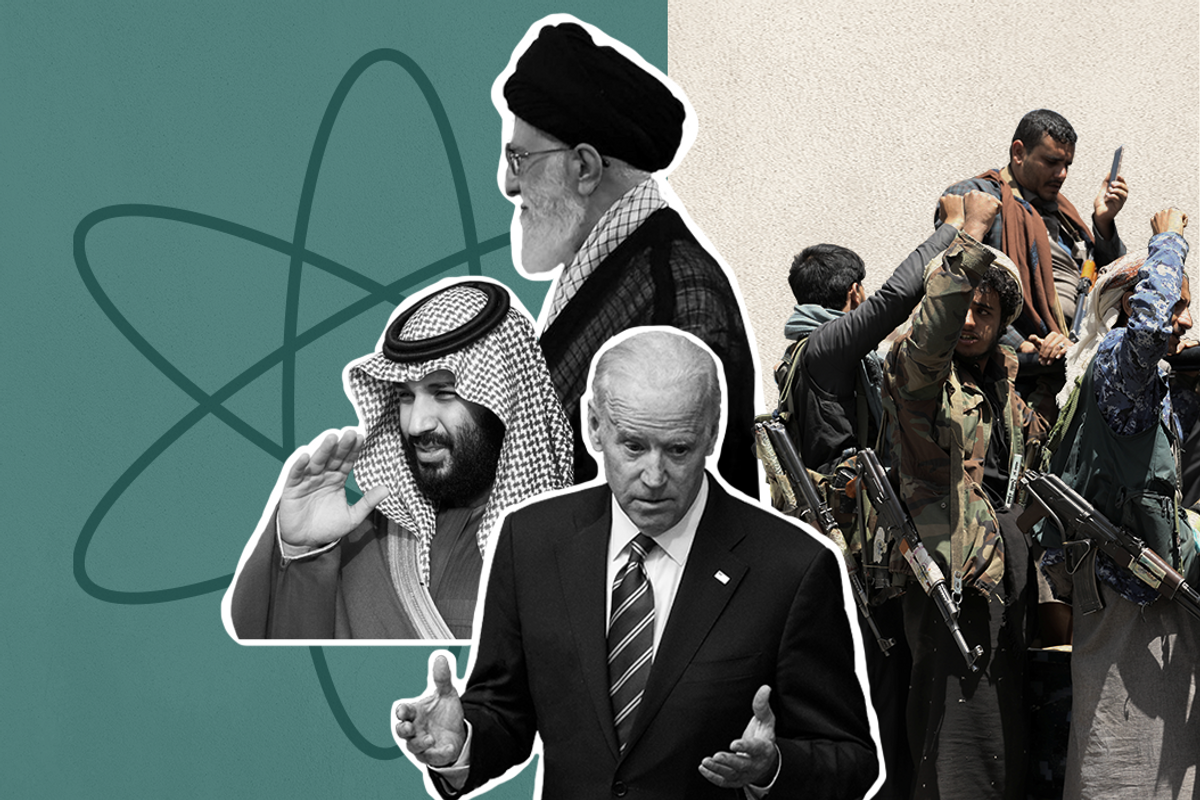It's been four weeks since Joe Biden moved into the White House, and he's already feeling the Middle East heat on multiple fronts. Conflict, nuclear threats, human rights abuses, and diplomatic snafus are challenging his administration's foreign policy priorities in the tumultuous region. What's unfolding there, and why does it matter?
Iran: "I will offer Tehran a credible path back to diplomacy"
As we've written before, the Biden administration has made clear that reentering the 2015 Iran nuclear deal is a foreign policy priority. But reengagement, Biden says, depends on the Iranians' willingness to rein in their bellicose behavior. Tehran, for its part, says that the onus is on Washington to make the first move.
This week, however, Iran upped the ante, saying it would block a UN nuclear watchdog from conducting snap inspections of some nuclear sites starting next week if the US does not lift crippling economic sanctions. Indeed, this puts Biden in a bind: He does not want to prove the naysayers right that the nuclear deal — which Biden himself was involved in crafting as VP — is doomed to fail because the Iranians can't be trusted. But he also can't be seen to cave to a scheming adversary just a month into his new gig.
It's also a race against the clock: Iranians will elect a new president in June, and as Iranian journalist Negar Mortazavi told GZERO Media last fall, Iran's "Death to America" wing may win, signaling the death knell for diplomacy with the US.
Iraq: Time to "end the forever wars"
A rare rocket attack Monday on US-coalition forces in Erbil, northern Iraq, killed one US military contractor and injured scores more. Perpetrators, widely believed to be Iran-backed Shi'ite militants, are baiting Biden to respond. On the one hand, retaliatory measures using force would contravene Biden's pledge to get less embroiled in "forever wars'' in the Middle East, and to continue Trump's policy of bringing US troops home. On the other hand, can Biden afford to let a brazen attack on a US military compound go unpunished?
The attack inside Kurdish territory was likely the work of a small militant group, reflecting Western intelligence agencies' fears that pop-up Shi'ite outfits are gaining a foothold in Iraq (with Iran's support) as the US seeks to curtail its presence there. When Biden gave a major foreign policy address two weeks ago, he didn't even mention Iraq or Afghanistan, but recent events prove he can't simply wish away these "forever wars."
Yemen: "Diplomacy should be the first instrument of American power"
Yemen's years-long conflict has reached a new nadir in recent weeks, as Iranian-backed Houthi forces intensified an offensive on the oil-rich city of Marib, the last government-held enclave, and have also intensified drone attacks against neighboring Saudi Arabia. The UN warns that the unfolding crisis could displace some 2 million people, deepening a humanitarian disaster that has already decimated Yemen.
This escalation comes as Biden has moved to withdraw US support for the Saudi mission in Yemen, seeking instead to employ diplomatic measures to end the conflict. The US also removed Houthi rebels from the US' State Sponsors of Terrorism list to help open Yemen up to more humanitarian aid.
Biden reiterates that respect for human rights and diplomacy will be at the heart of US foreign policy in Yemen going forward, but the deteriorating situation on the ground as the Iranians increase their investment in the Houthis, makes a peaceful resolution of that conflict in the near-term increasingly unlikely.
Saudi Arabia: "Recalibrate our relationship"
In contrast to the Trump administration's cozy relationship with the Saudis, Biden says he will not tolerate the kingdom's regional machinations and human rights abuses. On top of ceasing its support for Riyadh in Yemen, the White House now says that it will speak directly to King Salman, who is 85 and relinquished control of daily affairs. The move is widely seen as a diss of Crown Prince Mohammed bin Salman, the country's influential de facto leader. But Biden's stiff-necked approach appears to be working (for now): the Saudis have extended several olive-branches, including releasing from prison the high-profile women's rights activist Loujain al-Hathloul.
Biden's priorities. The US president's priorities may be COVID, economic recovery, climate change, and China, but the Middle East won't cool down for him — and the US is deeply enmeshed in the region, whether Biden likes it or not.






